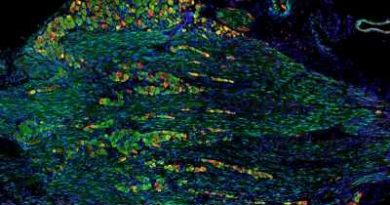Auburn University Alumni with Same Rare Eye Cancer Bond Over Mysterious Diagnosis
In 2001, after Allyson Allred was diagnosed with ocular melanoma, a rare and deadly eye cancer, she got her right eye removed to prevent its spread. But seven years later, the cancer metastasized to her liver, and since then to a dozen other areas of her body, including her brain, kidney, ovary and breast.
During her arduous battle with the cancer, Allred, 48, of Birmingham, Alabama discovered two friends from her days at Auburn University with the rare disease, as well dozens of others connected to the school — former students, employees or relatives of employees.
As medical researchers look for what is behind the mysterious connection to Auburn, Allred continues to maintain an unshakable faith that she will beat the odds.
“Specialists have told us that if we can find a cause, then we’re that much closer to finding a cure,” Allred tells PEOPLE.
Ocular melanoma is diagnosed in about 6 people per 1 million in the U.S. every year. It represents just 2 to 5 percent of all melanoma cases but is much more lethal, Dr. John Mason, an ocular oncologist at the University of Alabama at Birmingham who is heading the research into the Auburn cases, tells PEOPLE.
In 50 percent of the cases, the cancer metastasizes to the liver within 10 years, killing 96 percent of those victims within three years. “There is no known cause,” he says.
When Allred was diagnosed, she contacted Juleigh Green, a friend from Auburn who had her left eye removed after discovering she had ocular melanoma in 1999.
“We immediately bonded and were constantly talking and praying together,” Green says. “And I kept thinking, ‘How strange is this that we both have this rare disease?’ ”
In 2008, when the cancer spread to Allred’s liver, an ablation treatment destroyed the tumor. Four years later, Allred’s Auburn friend and Green’s sorority sister, Ashley McCrary was diagnosed and had her right eye removed, the trio leaning on each other for support.
This has been invaluable for Allred, as the cancer returned to her liver in 2013, and again in 2014. It’s also been found in her uterus, right ovary, her breast, kidney, adrenal gland, next to her thyroid, in tissue near her heart, and in her brain.
“The prayers make the biggest difference,” Allred says. “I can actually physically feel them when I go in for a treatment.”
Allred’s treatments have included surgeries, drugs and radiations. Thursday afternoon, she was lying on a table in an Alabama hospital receiving radiation to kill the ocular melanoma that’s spread to her brain.
Despite these arduous therapies and recurrences —the cancer is currently in eight other areas of her body in addition to her brain — Allred remains upbeat and optimistic, certain that God carries her through every setback.
“It truly is her faith that is getting her through this,” says McCrary. “It makes no sense she can respond the way she does. I think she is the bravest person I know.”
A group text among the friends Thursday sending prayers included Lori Lee, 54, a Guntersville, Alabama pharmacist and Auburn alumni diagnosed in 2013.
By 2017, the cancer had spread to Lee’s liver. She receives treatments at Thomas Jefferson University Hospital in Philadelphia, where Allred has been seen.
“The four of us have such a bond,” says Allred.
Allred believes the cancer won’t afflict her daughter, now an Auburn senior. She as well as children of McCrary and Lee have attended the university — this before any of the women discovered in the last year that at least 36 people with a connection to Auburn have ocular melanoma, most there between 1983 and 2001.
To speed up research into the cause of the disease, the women have created their own fundraising efforts (eyepatchchallenge.org) that have raised about $14,800.
“I want to get to the bottom of what is causing this, I feel there is some kind of connection,” says Green, whose daughter Caroline, 18, is attending Auburn in the fall.
She isn’t worried. “You can’t live in fear,” she says. “I feel like it’s still very rare, it’s like worrying every time you get in a car.”
Source: Read Full Article



